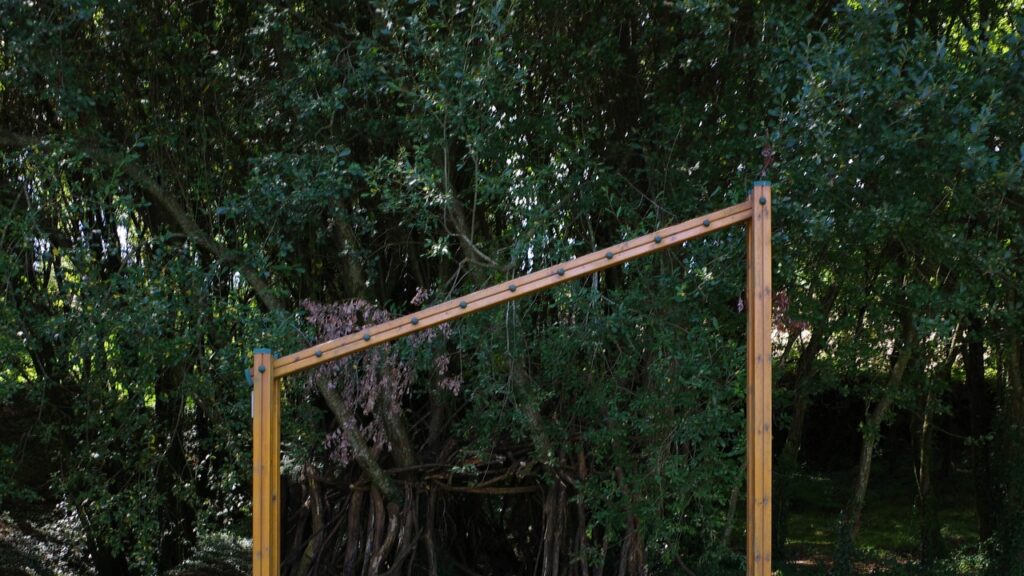
KMRU is not the call sign of a radio station, though it could very well be. The calendar of this imaginary broadcaster would vary in format and genre. Shows would change frequently: evolve, morph, disappear. To tune into KMRU would mean being surprised. Some shows would feature lengthy abstract drones, others would venture into the territory of techno, or focus on cerebral minimalism, and some would feature guest instrumentalists and vocalists. Yet for all that unpredictability, to pull up KMRU on your radio dial would invariably entail hearing field recordings—sometimes in their raw, undigested form, but far more frequently augmented by all manner of digital techniques and aesthetic practices.
But of course KMRU isn’t a radio station; KMRU is a lone individual (if an impressively prolific one). That taut quartet of letters is a compression of his family name: Kamaru. First name Joseph, born in Nairobi, Kenya, and relocated to Berlin, Germany, he has over the past few years become a widely referenced figure in contemporary electronic music, excelling in all the sounds mentioned above. Throughout it all, field recordings have been central to his work—quarried for their textural qualities, or sliced and diced into corrosive soundscapes, or laid bare to serve as vicarious sonic travel aids.
But on his new album Dissolution Grip, the first release from his own label, OFNOT, he manages to remove field recordings entirely while nonetheless amplifying their presence. (If KMRU actually were a radio station, this radical shift would suggest a change in management had occurred.) During his studies with artist and composer Jasmine Guffond at Berlin’s Universität der Künste, KMRU developed a technique of rendering field recordings into visual representation, then interpreting those images as graphic scores. Yet despite the absence of bird song, traffic din, and quotidian clatter, KMRU’s emphasis on long-form immersive explorations persists.
The album fades in quickly. Within a split second, the opening track, “Till Hurricane Bisect,” rises to an unsteady hum, like a drum kit’s cymbal resonating to nearby traffic. Halfway through its 15 minutes, you might mistake the piece for the audio of a wartime documentary, due to a hovering, whirring noise, like a helicopter overhead, sweeping the territory. The most chilling sounds, though, are close-ups: little knocks that will have you pausing the music to check if someone is trying to get your attention. His under-recognized gift for melody is evident when a slow monosynth line emerges—a green shoot, a hopeful moment—before it is suffocated by clanging.
On the title track, tonal moments toward the end sound very much like KMRU is singing along, intoning with the synthesized drones. It may simply be a trick of the overtones, or perhaps a deep man-machine empathy. Elsewhere amid its 13 and a half minutes are toothed zithers and euphonious timbres, palpitating murmurs and demanding noises—in other words, many of the emotional cues one might expect from KMRU, just rendered through different means. To listen is to wonder what is being represented, or reconstituted: from sound to image and back to sound again. Here and on the closing track, the 12-minute “Along a Wall,” the music begins to resemble a Sarah Davachi organ piece or a Harry Bertoia sound sculpture—or, more than anything, old-school space music. Having moved to Germany from Kenya, KMRU has tapped into the country’s storied vein of kosmische: rather than field recordings of our planet, an offworld sound born of technology.
The album title does leave a lingering question. What exactly is in a state of “dissolution”? Is he implying that field recordings have loosened their hold on him—and if so, will we listen back to it as a pivotal point in his career, or simply one among many exploratory works? But don’t take Dissolution Grip to be the conclusion of KMRU’s engagement with everyday sound, at least not for now. As early as the end of October, he’ll have yet another album out, Stupor, this time on the Helsinki-based Other Power label. It is packed with ordinary noises transformed into music rich with drama and compositional heft. Its opening track interweaves oscillating purrs with the voices of children at play and the beep of a truck backing up. In other words, classic KMRU.
